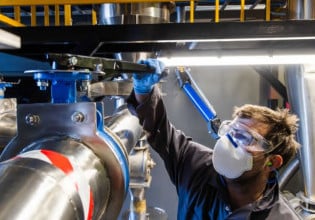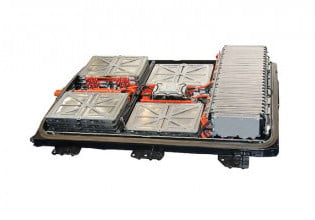Berlin will be the first capital city to turn a complete bus line into an eco-friendly route using e-buses with the wireless PRIMOVE charging system and the compact PRIMOVE battery system. Starting in summer 2015, passengers on the city centre bus line 204 will be able to enjoy a quiet and zero-emission ride through Berlin. The German Federal Ministry of Transport and Digital Infrastructure (BMVI) is supporting the project in the context of the "International Showcase Programme for E-mobility Berlin Brandenburg".
On the occasion of the installation of the inductive charging pad at Berlin’s first charging station today, the project partners Berliner Verkehrsbetriebe (BVG; Berlin public transport authority), Technical University (TU) Berlin and Bombardier Transportation invited representatives from the BMVI, the City of Berlin and media to inform them about the technical details of the wireless charging technology, the current project status and the further project milestones. At the event, guests had the rare opportunity to inspect the charging pad, which will be invisibly embedded under the ground in just a few days. The precast charging pad weighs seven tons, is five meters long, two meters wide and 25 centimetres thick.
Bombardier’s innovative PRIMOVE system charges the Berlin buses' batteries at 200-kW in the very few minutes of dwell time spent at the end stations. This allows the e-buses to serve the 6.1 km long bus line back and forth – without additional stops or battery changing for an entire day. As with an electric toothbrush, charging works without a cable connection. As soon as the e-bus is positioned over the underground charging pad, the pick-up coil mounted on the underside of the vehicle lowers. The inductive energy transfer begins, generating an electromagnetic field. This poses no danger to drivers, passengers or pedestrians – or even to people with pacemakers. With the optimization of the transfer frequencies and advanced shielding, the charging system falls well below the very strict European limit values for electromagnetic emissions.
Starting in April 2015, additional PRIMOVE charging stations will be installed at the route’s second end stop as well as at BVG’s bus depot where the four e-buses will be based. The e-buses will be built this spring by the Polish manufacturer Solaris. The twelve meter long vehicles are equivalent to the Urbino 12 electric bus equipped with PRIMOVE charging and batteries, which has been in successful passenger operations in Braunschweig, Germany, since March 2014. The delivery of the first e-bus to the Bombardier site in Mannheim, Germany, for final coordination of the technical components is planned for May 2015. Following this, the vehicles will be delivered to Berlin for approval and commissioning. In summer 2015, passenger operations on route 204 will commence.
Berlin’s new fleet of e-buses will save around 260 tons of CO2 per year. In order to achieve the same effect, around 250 private cars in Berlin, on the basis of normal driving behavior, would have to be switched to electric mode.






